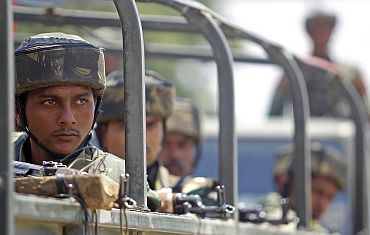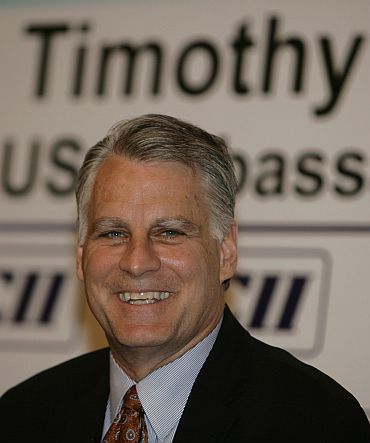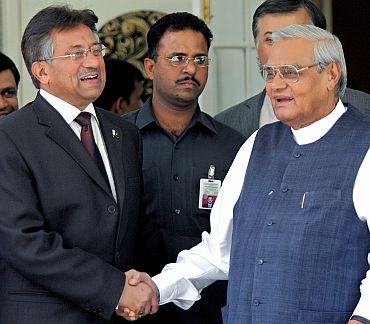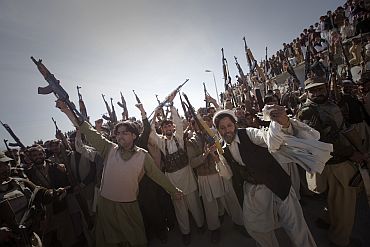
American embassy cables leaked by whistleblower website WikiLeaks reveal that the United States conducted its own secret analysis of India's military contingency plans codenamed 'Cold Start', the Guardian reported.
"It is the collective judgment of the mission that India would likely encounter very mixed results. Indian forces could have significant problems consolidating initial gains due to logistical difficulties and slow reinforcement," according to an American cable.
But the US ambassador to India, Tim Roemer warned in February that for India to launch Cold Start, would be to "roll the nuclear dice".
It could trigger the world's first use of nuclear weapons since Hiroshima and Nagasaki.
Text: PTI
Please ..

Roemer further said that the implementation of India army's Cold Start doctrine, which lacks consensus in India and has not been fully embraced by the Manmohan Singh government, is likely to yield "mixed results" if put to use under present circumstances, the cable said.
"The Indian army's 'Cold Start Doctrine' is a mixture of myth and reality. It has never been and may never be put to use on a battlefield because of substantial and serious resource constraints, but it is a developed operational attack plan announced in 2004 and intended to be taken off the shelf and implemented within a 72-hour period during a crisis.
"Cold Start is not a plan for a comprehensive invasion and occupation of Pakistan," said the US cable, dated February 16 and signed off by Roemer.
"Instead, it calls for a rapid, time and distance- limited penetration into Pakistani territory with the goal of quickly punishing Pakistan, possibly in response to a Pakistan-linked terrorist attack in India, without threatening the survival of the Pakistani state or provoking a nuclear response," it said.
"It was announced by the BJP-led government in 2004, but the government of Prime Minister Manmohan Singh has not publicly embraced Cold Start and GOI uncertainty over Pakistani nuclear restraint may inhibit future implementation by any government," it said, adding that if the Indian government were to implement Cold Start given present Indian military capabilities, it is the collective judgment of the US mission that India would encounter mixed results.
"The GOI failed to implement Cold Start in the wake of the audacious November 2008 Pakistan-linked terror attack in Mumbai, which calls into question the willingness of the GOI to implement Cold Start in any form and thus roll the nuclear dice."
"At the same time, the existence of the plan reassures the Indian public and may provide some limited deterrent effect on Pakistan," the cable said.
"We think that the November 2008 Pakistan-linked terror attack in Mumbai and its immediate aftermath provide insight into Indian and Pakistani thinking on Cold Start.
"First, the GOI refrained from implementing Cold Start even after an attack as audacious and bloody as the Mumbai attack, which calls into serious question the GOI's willingness to actually adopt the Cold Start option," it said.
"Second, the Pakistanis have known about Cold Start since 2004, but this knowledge does not seem to have prompted them to prevent terror attacks against India to extent such attacks could be controlled. This fact calls into question Cold Start's ability to deter Pakistani mischief inside India," it said.
"Even more so, it calls into question the degree of sincerity of fear over Cold Start as expressed by Pakistani military leaders to USG officials. Cold Start is not India's only or preferred option after a terrorist attack."

Depending on the nature, location, lethality, public response, and timing of a terrorist attack, India might not respond at all or could pursue one of several other possible options, it said.
"Finally, several very high level GOI officials have firmly stated, when asked directly about their support for Cold Start, that they have never endorsed, supported, or advocated for this doctrine. One of these officials is former National Security Advisor M K Narayanan, who has recently been replaced. While the army may remain committed to the goals of the doctrine, political support is less clear," the cable said.
The cable said Indian leaders realise that, although Cold Start is designed to punish Pakistan in a limited manner without triggering a nuclear response, they cant be sure whether Pakistani leaders will in fact refrain from such a response.
"Even in the absence of a Pakistani nuclear response, GOI leaders are aware also that even a limited Indian incursion into Pakistan will likely lead to international condemnation of Indian action and a resulting loss of the moral high ground that GOI leaders believe India enjoys in its contentious relationship with Pakistan," it said.
According to the cable, the Indian governments intent to ever actually implement Cold Start is very much an open question.
"The Cold Start doctrine was announced in April 2004 by the BJP-led government that was replaced shortly thereafter by the Manmohan Singh government, which has not since publicly embraced Cold Start," it said.
"A political green-light to implement Cold Start, fraught as it is with potential nuclear consequences, would involve a highly opaque decision-making process and would likely necessitate broad political consensus, a factor that could prolong the time between a precipitating event such as a Pakistan-linked terror attack and Cold Start deployment (which in turn could reduce the element of surprise)," it said.

A senior US intelligence official was "unrelentingly gloomy" about Pakistan.
Peter Lavoy, national intelligence officer for south Asia, concluded in November 2008 that nuclear-armed Pakistan's economy was "in tatters" and the country could "completely lose control of its Pashtun territories over the next few years", according to a leaked US cable.
More than a third of people were unemployed or underemployed, he said.
"Pakistan's population is becoming less and less educated, the country lacks sufficient energy and clean water resources to serve its population, and there is minimal foreign investment."
A few months later, in April 2009, US official Patterson was slightly less gloomy, saying Pakistan was not a "failed state".
"We nonetheless recognise that the challenges it confronts are dire. The government is losing more and more territory every day to foreign and domestic militant groups; deteriorating law and order in turn is undermining economic recovery.
"The bureaucracy is settling into third-world mediocrity, as demonstrated by some corruption and a limited capacity to implement or articulate policy."
She said: "Extremism... is no longer restricted to the border area. We are seeing young Punjabi men turn up in (the tribal areas) and Afghanistan as fighters recruited from areas of southern Punjab where poverty, illiteracy and despair create a breeding ground for extremism."